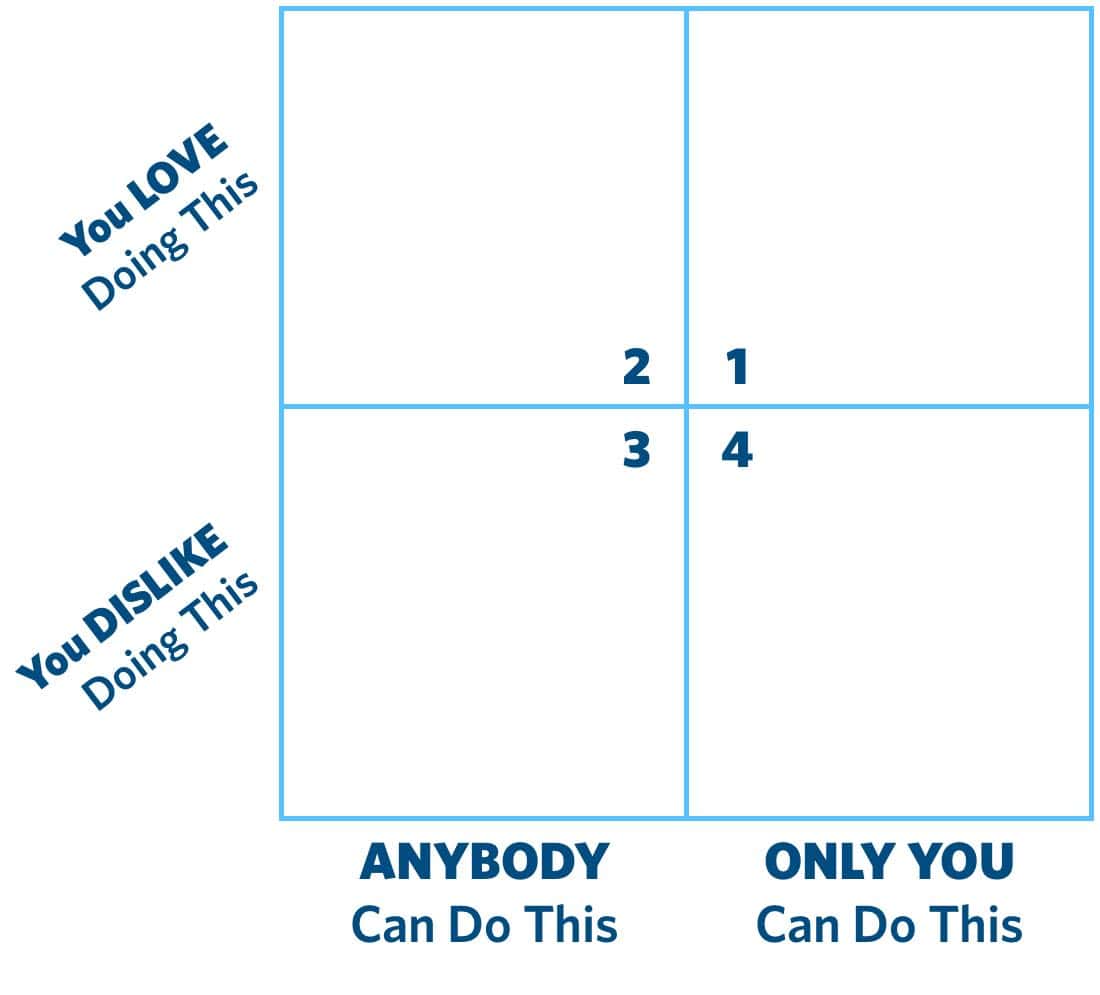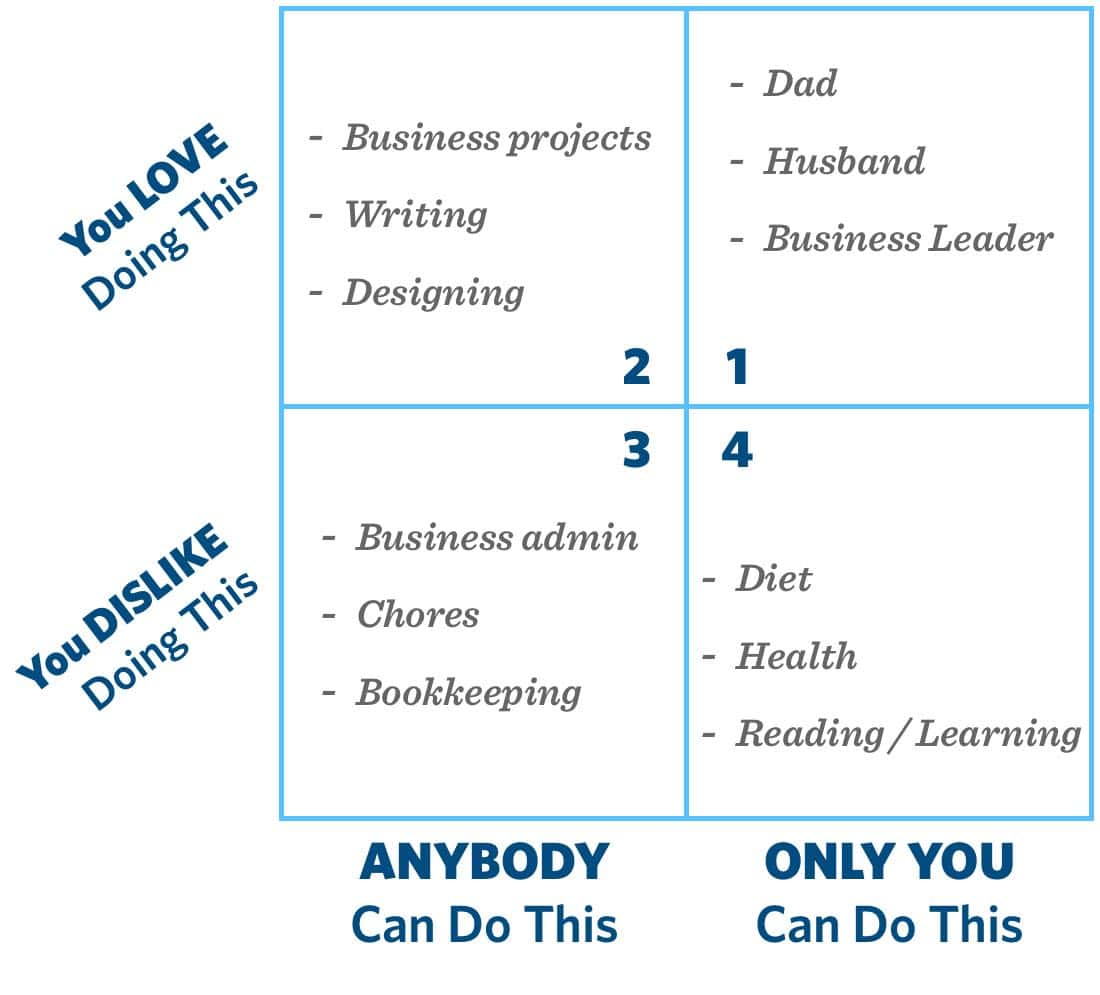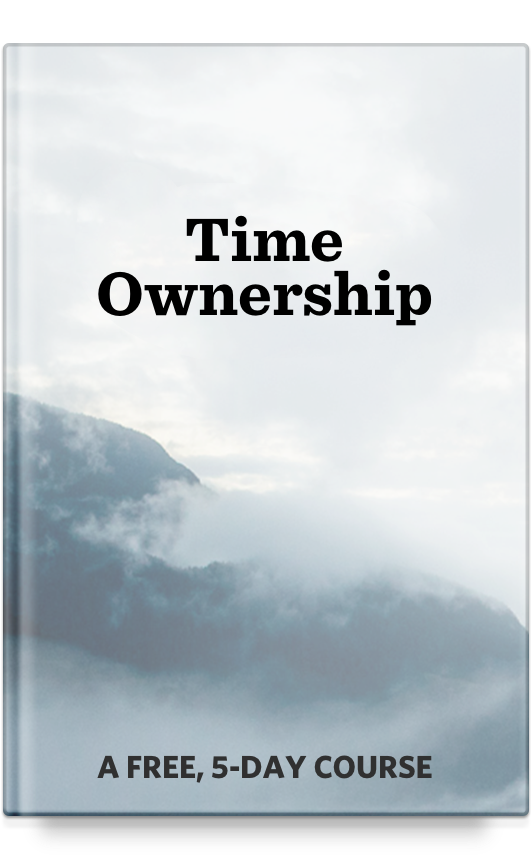From time to time life can get a bit overwhelming.
Things can get overwhelming at work, at home, or both.
One way to get out from the overwhelm is to get clarity about two things:
- What matters most right now.
- What you can do about it.
With that in mind, below I’ve outlined a simple activity you can do. It takes about 10 minutes and it can help you make sense of things when you’re feeling overwhelmed.
But, before we dive in…
Have you ever looked up the dictionary definition of “overwhelm”? It’s pretty intense, actually.
Let’s talk about Margin… We’ve got a course all about reclaiming margin. Margin is essential to living a meaningful and fulfilled life. And chances are good you could use some breathing room in your days. If you’d like to be kept in the loop about when registration opens up next, just let us know.
The Definition of “Overwhelm”
- Bury or drown beneath a huge mass
- Defeat completely
- Give too much of a thing to someone
Do you ever feel this way?
- Have you been given too much to do?
- Do you feel buried?
- Do you feel drown beneath a huge mass of stuff?
- And as a result, do you feel overpowered and defeated?
It sucks, right?
When you’re overwhelmed it can feel impossible to find the time you need to get anything done.
It gets worse is when everything seems important. How can you possibly put aside 99% of your responsibilities for a few hours in order to focus on just one thing?
I don’t know about you, but I used to feel guilty at neglecting all the other important things I wasn’t doing, when I would try to focus on at least one thing that was important.
It’s nonsensical that you can work on everything all at the same time. But who says we humans are rational, sensical people?
How to Make Sense of Things When You’re Feeling Overwhelmed
Do this:
Start by making a note or a list of the following:
- What urgent issues do you have right now?
- What areas of responsibility are you managing?
- What projects are you working on?
- What things do you feel that you should be doing but you’re not?
You may find it helpful to reference your calendar and your to-do list from the past week or two in order to see exactly activities and tasks you’ve done.
Now, take your list and put each item it’s proper box in this matrix:

- Box 1: Things you enjoy that ONLY YOU can do
- Box 2: Things you enjoy that ANYBODY could do
- Box 3: Things you dislike that ANYBODY could do
- Box 4: Things you dislike that ONLY YOU can do
Now, looking at those boxes, how does it make you feel?
For reference, here’s what my matrix looks like (for the sake of brevity I focused only on high-level areas of responsibility and the tasks that fall under those domains):

Looking back at your own matrix, consider this:
The Things ONLY YOU Can Do
The items in boxes 1 and 4 are things which only you can do.
It is all on you to take responsibility and ownership for these areas and tasks within your life. You must choose to prioritize them.
Do you have the margin and the focus to do these things that only you can do? Or are you neglecting these activities and responsibilities in order to spend time on areas that someone else could be doing instead?
I know of many business owners and other executives who do not take care of their physical health and their family life is suffering. These are areas that only they can address for themselves, but they are too busy at work and have not figured out how to delegate to their team.
Something Greg McKeown talks about in his book, Essentialism, is the idea that those things which are absolutely essential should never be ignored or neglected at the behest of those things which are not essential.
McKeown also writes that “many capable people are kept from getting to the next level of contribution because they can’t let go of the belief that everything is important.”
And along those same lines, Dawson Trotman says to “never do something that others can or will do when there is so much of importance to be done that others cannot or will not do.”
The liberating truth is this: not everything is important.
Pro Tip for Box 4 Stuff
Those things in Box 4? The the things you don’t like, but that only you can do?
Here’s a tip:
Put systems in place that help you automate those things.
Habits and routines help keep important areas of your life on track even when you can’t — or don’t want to — give those areas your full attention.
Also, the truth is that over time, if you choose an action or behavior for long enough, it begins to choose you back. In the beginning, as you are learning and developing a new skill or a new lifestyle practice, it feels like you are pushing things up hill. But then, over time, that action begins to pull you — it becomes easier to keep moving forward.
A lot of folks refer to this ad “duty to delight”.
(Habits and lifestyle practices as well as “joy in the journey” are all topics that I cover in a ton more detail within The Focus Course, which we’ll be opening up for registration on May 21st.)
The Things ANYBODY Can Do
Now look at what items you have put into boxes 2 and 3.
Like it or not, these are the things which anybody can do.
Which means this: If you are struggling to accomplish stuff from boxes 1 and 4, then you need to find a way to give up some things that exist in boxes 2 and 3. (Not easily done, I know. But we’ll get to that in a moment.)
What things are in Box 2? While you may love to do these things, make sure they’re not distractions that are keeping you from the things in Box 1.
What things are in Box 3? These must go! Delegate them to someone else. Or learn how to automate the process of that work. Look see if you can eliminate these tasks altogether.
Common Reasons we Struggle to Delegate, Automate, or Eliminate Tasks
- Pride: Perhaps you’re too stubborn or afraid to delegate a task because you don’t think anyone can do it as well as you do. You might be right. But keep in mind that by holding on to that responsibility you are, by nature, taking away time and energy from other, more-important things that only you can do.
-
Tradition / habit: Perhaps you’ve been doing that task for so long that you never considered an alternative.
-
No other choice: At this point in time, you may not have the resources or the opportunity to delegate that task to someone else. If this is the case, then consider ways you can automate and systematize the process in order to make it easier and faster for you.
-
Too lazy to delegate: Maybe you’re still doing the task because every time it comes up, you think to yourself that it’s easier if you just do it yourself this time around. And then again. And again…
The Power of Delegation (Two Examples)
Here are two examples of things that I did not enjoy doing and that I realized other people could help me with.
- Lawn mowing: I’ve never liked mowing my lawn. And so, when we moved into our neighborhood and discovered there was a group lawn-mowing option, I opted in as fast as I could. Every time the lawn mowing crew comes through, I have so much joy that I don’t ave to be doing that job. And, moreover, by having someone else mow my lawn it gives me additional 1:1 time with my family every single weekend for about 8 months of the year.
However, in order for me to delegate this task, I had to get over the pride of home ownership and also the pride of spending money.
-
Bookkeeping: For the first 6 years of my business, I managed all the books and financials. This took up 2-3 hours every Sunday afternoon. A few years ago I finally decided to outsource this responsibility to a professional bookkeeper. And I am so glad that I did.
Delegating that responsibility has given me more mental energy to focus on buildin my business. And it gave me back nearly 150 hours a year that I can spend with my family.
But in order to do it, I had to give up control over the work of doing my own accounting and bookkeeping. I have a somewhat unconventional budgeting approach, and so I had to learn to communicate with my bookkeeper about what my expectations are for our accounting and tell her how I budget things.
The Liberation that Comes With Clarity
Looking again at the copy of my filled-in matrix below, let me share a few insights…

You’ll see that I put writing, designing, and project management in Box 2. These are things I love to do, but my job within my company as a writer, designer, and project manager is totally replaceable. Even though those activities are critical to our business model, I could train someone else to do that work. (In fact, I am training someone else to do that work.) And, to be candid, they could probably do it better than I do.
However… what’s NOT replaceable within my company is my leadership as the owner. My taste, values, and vision for the work we do are unique. Only I can speak vision to my team.
Therefore, if the work I’m doing in Box 2 begins to interfere with my responsibilities in Box 1, then guess what? Time to make a change.
Let’s talk about Margin… We’ve got a course all about reclaiming margin. Margin is essential to living a meaningful and fulfilled life. And chances are good you could use some breathing room in your days. If you’d like to be kept in the loop about when registration opens up next, just let us know.
. . .
I love looking at the things in my life that ONLY I can do, and nobody else can do for me. It’s liberating to know exactly what I’m in charge of.
- Only I can be a husband to my wife.
- Only I can be a father to my kids.
- Only I can take care of my health by eating well and staying active.
- Only I can lead my business in the direction I want it to go.
- Only I can take responsibility of my personal development through reading, learning, and living a focused life.
When you’re feeling buried under a mass of stuff, it can feel as if you’re responsible for everything in the whole world.
But good news: you are not responsible for everything in the whole world.
That’s why it can be liberating to step back and get clarity about the things that ONLY YOU can do. Now, simply focus on those few things.
